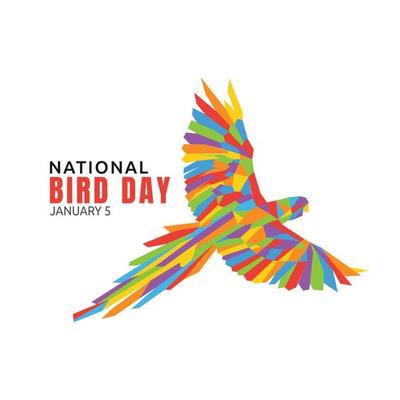“10 Powerful Facts About National Bird Day 2025 You Must Know”
National Bird Day: 10 Fascinating Facts and Insights You Should Know
Introduction to National Bird Day
National Bird Day is observed annually on January 5th. This day serves as a reminder of the importance of birds in our ecosystem and encourages people to celebrate and protect our feathered friends. It’s an opportunity for bird lovers, conservationists, and anyone who admires nature to come together and advocate for bird protection and environmental sustainability.
History and Origins of National Bird Day
National Bird Day was established in 2002 by The Avian Welfare Coalition. The day was created with the goal of educating people about the role birds play in the environment and highlighting the issues they face, such as habitat destruction, poaching, and the illegal pet trade. Birds, like all animals, face significant threats to their survival, making it essential to raise awareness about their well-being and conservation.
The date of January 5th was chosen to commemorate the start of the new year, encouraging people to make new resolutions related to nature, and especially the protection of birds. It’s also a great time for individuals to connect with nature, observe local birds, and contribute to bird conservation efforts.
Observing National Bird Day
There are several ways to observe National Bird Day:
- Bird Watching: One of the most popular ways to participate in National Bird Day is by going bird watching. Whether in your backyard, at a local park, or at a wildlife sanctuary, observe the diverse species of birds that exist in your area.
- Supporting Conservation: Support organizations that focus on bird conservation efforts. Donate, volunteer, or raise awareness about the threats birds face, such as deforestation and climate change.
- Educating Others: Use National Bird Day as an opportunity to teach others about the importance of birds in our ecosystems. Share facts about endangered bird species, their behavior, and how they contribute to biodiversity.
- Building Bird-Friendly Habitats: If you enjoy gardening or landscaping, consider planting bird-friendly plants or installing birdhouses to help provide a safe environment for local bird populations.
- Avoiding the Pet Trade: If you’re considering adding a bird to your household, adopt from shelters or bird rescue organizations rather than buying birds from pet stores that source from the illegal trade.
10 Fascinating Facts About Birds
- Diverse Species: There are approximately 10,000 species of birds worldwide, each with unique behaviors, diets, and habitats.
- Long Migratory Journeys: Some bird species migrate thousands of miles each year. The Arctic Tern holds the record for the longest migration, traveling between the Arctic and Antarctic.
- Birdsong: Many birds, such as songbirds, are known for their complex songs, which they use to communicate with other birds, claim territory, and attract mates.
- Feathered Dinosaurs: Birds are considered modern-day descendants of dinosaurs, specifically theropods.
- Vision: Birds generally have excellent vision. Some, like eagles, can see up to four times farther than humans.
- Flying Machines: Birds are the only creatures capable of true flight, although bats and insects can also fly, they don’t have the same flying mechanics.
- Impressive Lifespan: Some birds, like parrots, can live for over 80 years in captivity, which is longer than many human lifespans.
- Pollinators: Birds play a role in pollination. Species like hummingbirds are essential for pollinating flowers while searching for nectar.
- Endangered Species: Over 1,200 species of birds are listed as endangered or critically endangered, often due to habitat destruction and illegal hunting.
- Keystone Species: Birds are often keystone species, meaning their presence and actions significantly influence their environment, often helping to control insect populations or spread seeds.
Importance and Significance of National Bird Day
National Bird Day is significant for several reasons:
- Conservation Awareness: It draws attention to the declining bird populations worldwide due to threats like climate change, deforestation, and the illegal pet trade.
- Ecological Balance: Birds play a vital role in maintaining the balance of ecosystems by controlling pests, pollinating plants, and dispersing seeds.
- Encouraging Positive Action: The day inspires individuals to take positive actions, such as creating bird-friendly habitats and supporting conservation organizations.
- Connection to Nature: Observing National Bird Day offers a chance to reconnect with nature and remind ourselves of the beauty of the natural world.
National Bird Day FAQs
Q1: Why is National Bird Day important?
National Bird Day is important because it raises awareness about the challenges birds face and promotes actions that can help protect them.
Q2: What can I do to help birds on National Bird Day?
You can help by donating to bird conservation organizations, observing birds and learning more about them, planting bird-friendly plants, and avoiding supporting the illegal bird trade.
Q3: How can I become involved in bird conservation?
You can become involved by volunteering with local wildlife groups, adopting a bird from a shelter, or supporting policies that protect natural habitats.
Conclusion: Why National Bird Day Matters
National Bird Day is a powerful reminder of our responsibility to protect birds and the environment. Birds have an irreplaceable role in maintaining the balance of ecosystems, and with the rise of environmental challenges, it’s essential to continue our efforts to ensure their survival. Whether you observe the day by going bird watching, supporting conservation efforts, or simply learning more about birds, every small action helps.
By celebrating National Bird Day, we recognize that birds are not just beautiful creatures, but key players in maintaining the world we live in.










